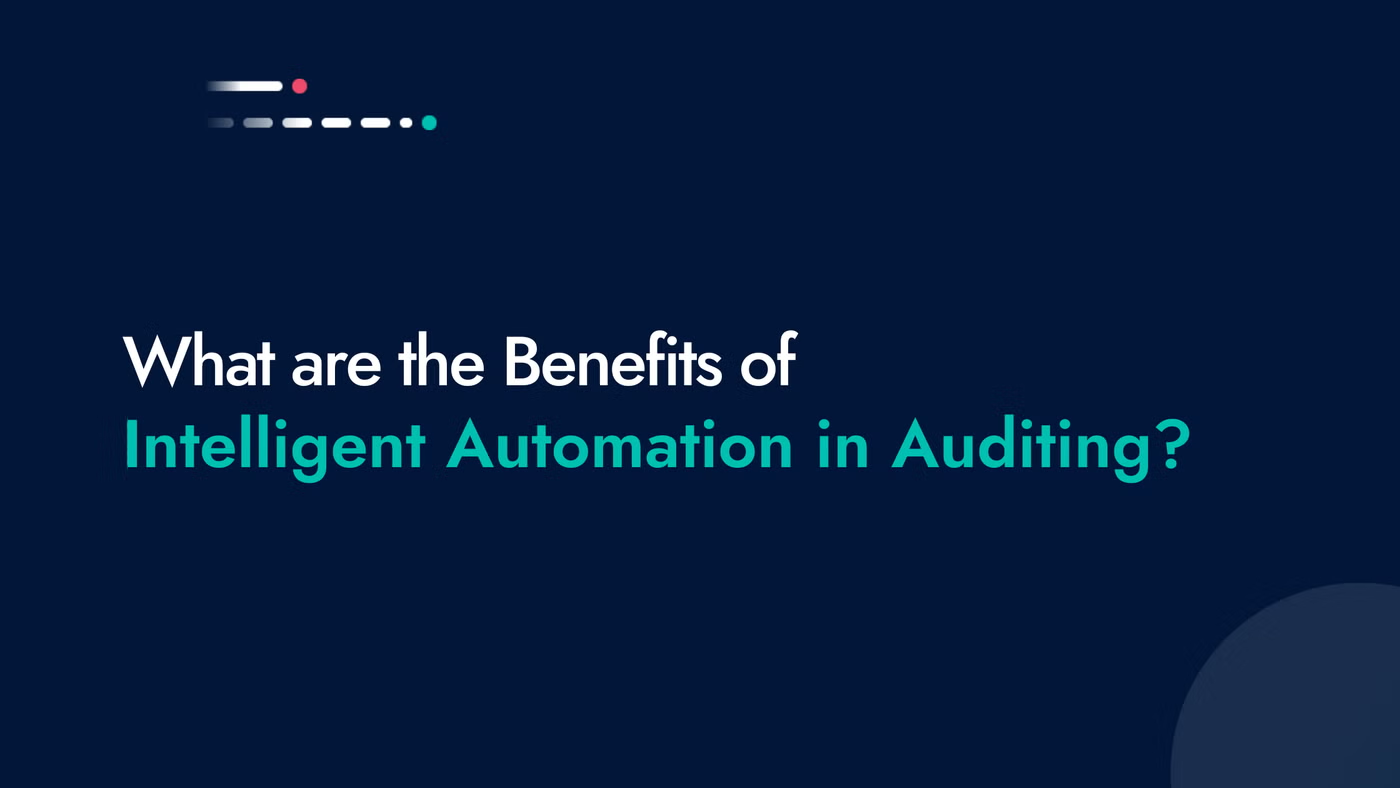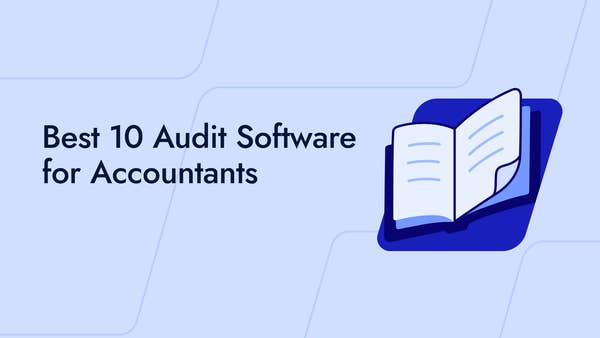- /
- Blog
What are the Benefits of Intelligent Automation in Auditing?

How intelligent automation and auditor expertise combine to improve accuracy, efficiency, and audit quality.
By handing these jobs to technology, auditors can focus on higher-value tasks, make informed decisions, and contribute to improved financial governance within organizations.
What is Intelligent Automation?
The latest generation of automation tools is about more than just saving time and money.
Intelligent automation is still quicker and more cost-effective than traditional techniques, but it also enables qualitatively better results and empowers workers to focus on value-added tasks.
Intelligent automation is a synthesis of artificial intelligence and automation technologies. Some of the features it leverages include:
- Machine learning: This is the most common type of AI. Machine learning algorithms are trained using real-world data that allows them to make predictions or take actions without being explicitly programmed.
- Natural language processing: Using NLP, machines can understand, interpret, and use natural human language (instead of the restrictive syntax of computer code). This allows them to do things like extract information, summarize text, and perform human-like interactions.
- Robotic process automation: RPA involves the use of software robots (commonly called bots) to automate repetitive tasks by mimicking human interactions with user interfaces and systems. RPA eliminates manual effort, increases efficiency, and accelerates processes.
- Adaptive Learning: Intelligent automation systems can continuously learn and improve from experience. They adapt to changes in data patterns, refine their models, and optimize performance over time. This allows them to become more efficient, accurate, and effective as they gain more data.
Combining a variation of these techniques, intelligent automation can process and understand unstructured data, make complex decisions, and interact with humans in a more natural and user-friendly way.
The Connection Between Intelligent Automation and Auditing
Auditing involves many repetitive tasks that are fundamentally important to the job and need to be done accurately.
They are perfect candidates for intelligent automation — too complex for basic automation techniques and too tedious for highly qualified professionals.
By leveraging intelligent automation, auditors can improve the accuracy, efficiency, and effectiveness of their work.
Intelligent automation streamlines processes, enhances data analysis, enables real-time monitoring, strengthens risk assessment, facilitates compliance, and ensures comprehensive documentation — all crucial elements of the auditing process.
Automating these tasks allows auditors to focus on areas where they can use their expertise, which adds value for clients, accelerates professional development, and is ultimately much more enjoyable work.
Weakness of Basic Automation in Auditing
To understand how intelligent automation differs from more basic automation techniques, consider a common task: extracting financial data from spreadsheets and populating the information into predefined templates.
A simple automation tool can follow a set of rules and instructions to perform this task without human intervention. Once the data is populated, auditors can manually review and analyze the information.
While this technique reduces the manual effort of data entry and speeds up the process, it has some limitations:
- Human error: Even with basic automation of a relatively simple task, there is still a reliance on manual input and intervention. This increases the risk of data entry mistakes or oversights, which can lead to inaccurate results or missed anomalies during the auditing process.
- Limited scalability: Basic automation methods are not designed to handle very large volumes of data or adapt to changing requirements. As a result, when faced with increased workloads or complex tasks, manual or basic automation processes may become inefficient and time-consuming, leading to bottlenecks and lower productivity.
- Limited data analytics: Complex analytics and data mining tasks are beyond the scope of basic automation. This can limit auditors' ability to derive meaningful insights, identify patterns, or detect anomalies that may require further investigation.
- Higher costs and resource requirements: Manual data entry, verification, and validation can be time-consuming and resource-intensive. Basic automation may also require in-house development and maintenance of custom scripts or tools, which can incur additional costs and dependencies on technical expertise.
- Reduced flexibility and adaptability: Basic automation is typically less flexible and adaptable to changing auditing requirements. It may lack the agility to accommodate process modifications or updates quickly. As a result, auditors may face challenges in adjusting the automation processes to reflect new regulations, standards, or organizational changes.
Benefits of Intelligent Automation
Intelligent automation can address many of these weaknesses by using more sophisticated and efficient techniques to automate even complex tasks, providing real-time insights, reducing errors, and improving documentation of financial auditing processes.
The key areas where intelligent automation offers significant benefits include:
- Accuracy: Intelligent automation doesn't lose concentration or get weary. Intelligent automation technologies can analyze large volumes of financial data quickly and precisely, reducing the risk of human error and improving the overall accuracy of the auditing process.
- Efficiency: Released from time-consuming jobs, auditors can focus on higher-value tasks like data analysis, risk assessment, and complex decision-making.
- Growth: Using a standardized and centralized solution enables quicker scaling with business needs and provides the necessary flexibility required when scaling with business needs. Consistent processes, clear guidelines and roles, agile adaptation, and efficient time management, to name but a few.
- Collaboration: Increasing accuracy and efficiency and employing a standardized and centralized method of working across your business will see collaboration increase and drastically improve. Clearer communication, streamlined workflows, better accountability and tracking, and more.
- Compliance: Intelligent automation tools can validate financial data against regulatory requirements and generate comprehensive audit trails for documentation purposes.
Success Stories
We have a long track record of delivering intelligent automation solutions that help auditing teams improve the efficiency of their procedures, allowing them to focus on work that adds value for their customers and is more rewarding for their junior staff.
The following examples demonstrate how DataSnipper is making an impact in real-world applications.
- Visser & Visser: This mid-size audit firm in the Netherlands was keen to explore the benefits of automation by putting DataSnipper to the test, comparing its performance against traditional audit procedures. The results were clear: it performed audit tests up to 10 times faster using our snipping and document matching tools. Using a sample engagement from the construction industry, the firm was able to cut the time taken from 49 minutes to just 3 minutes for a 94% efficiency gain.
- Deloitte: As Deloitte in Germany moved towards full population testing, it wanted to replace error-prone manual sample tests with an automation solution. It needed something that could fit within the firm’s standardized audit procedures, while still allowing a high degree of flexibility to support individual client needs. DataSnipper measured up to these exacting requirements. With our intelligent automation, Deloitte was able to automate tests across all client assets and unlock major efficiency gains, earning “exceedingly positive” feedback from the team.
- BDO: BDO in the Netherlands wanted to improve its financial statement procedures. Too much time was spent on manual work, like re-calculating financial statements and scrolling back and forth through client documents to check for consistency and version differences. After adopting DataSnipper’s Financial Statement Suite, BDO found that repetitive audit tasks were performed three times faster, resulting in faster time-to-market. As an added benefit, our solution also helped the BDO team to focus more on the work they love, improving overall work culture and employee retention.
The Future of Audit is Intelligent Automation
Discover how intelligent automation is shaking up the audit profession and why many consider it the absolute future.
.png?width=600&quality=70&format=auto&crop=16%3A9)
